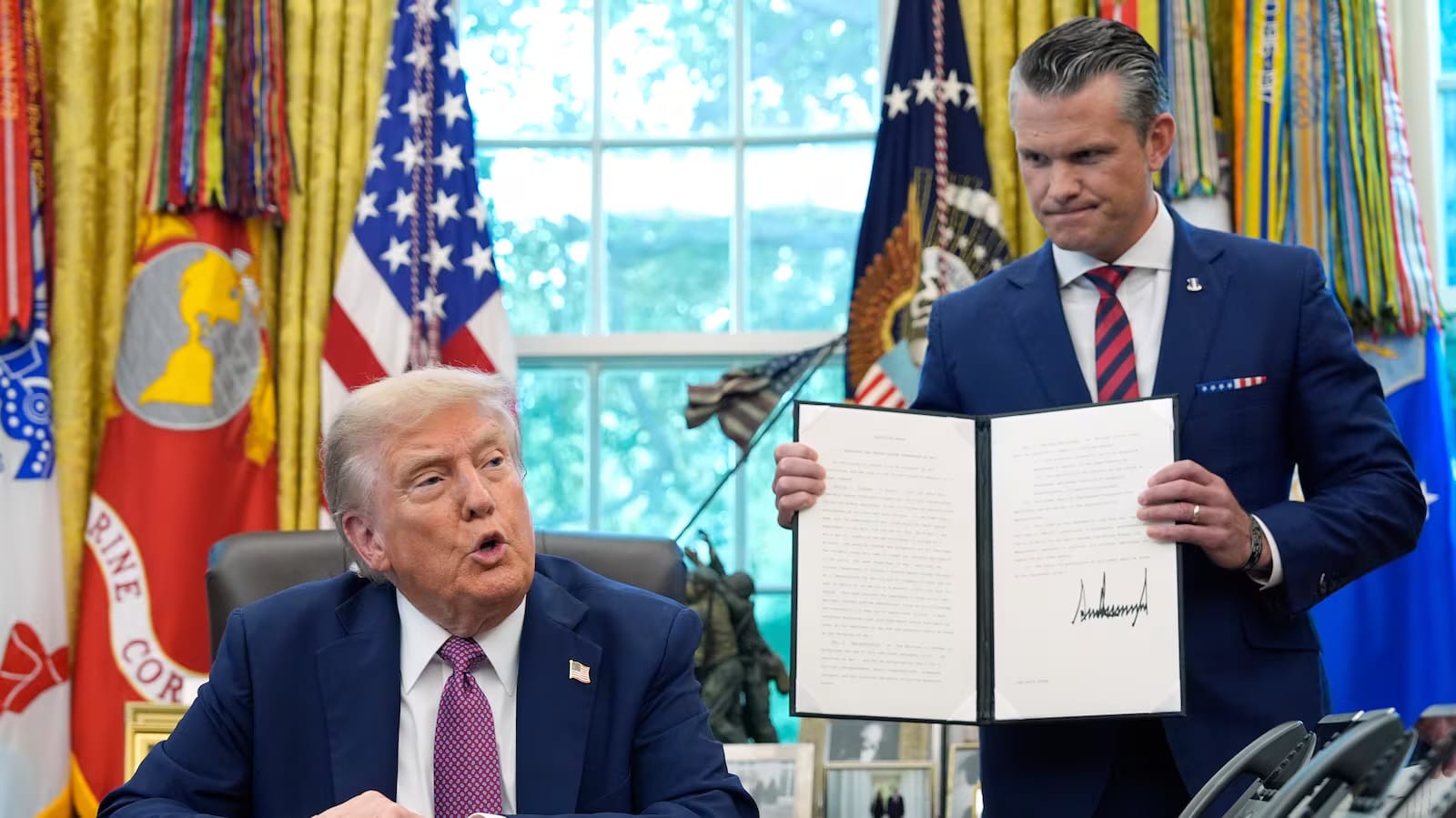Trump Signs Executive Order to Rebrand Department of Defense as Department of War
Move to Restore Historic Name Sparks Debate Over Military Messaging and Congressional Authority September 5, 2025 Washington, D.C. – President Donald J. Trump signed an executive order today directing the Department of Defense to adopt “Department of War” as a secondary title, reviving a name last used in the 1940s.
Move to Restore Historic Name Sparks Debate Over Military Messaging and Congressional Authority
September 5, 2025
Washington, D.C. – President Donald J. Trump signed an executive order today directing the Department of Defense to adopt “Department of War” as a secondary title, reviving a name last used in the 1940s. The order also authorizes Defense Secretary Pete Hegseth to use the title “Secretary of War” in official communications, aiming to project a stronger image of American military power. However, the change is not legally binding, as renaming the department permanently requires congressional approval.
The White House states that the “Department of War” title, used from 1789 to 1947, conveys a stronger message of readiness and resolve compared to the current name, which Trump has criticized as too defensive. The order instructs all executive branch agencies to recognize the secondary titles in internal and external communications and directs Hegseth to recommend legislative and executive actions to make the renaming permanent. The President believes this Department should have a name that reflects its unmatched power.
BREAKING: The Department of Defense ➡️ The Department of War 🇺🇸
— The White House (@WhiteHouse) September 5, 2025
President Donald J. Trump just signed an Executive Order restoring the name of the Department of War.
America First. Peace Through Strength.🦅 pic.twitter.com/jzk3MGQjpT
Trump, speaking in the Oval Office alongside Hegseth and Chairman of the Joint Chiefs of Staff Gen. Dan Caine, framed the rebranding as a return to America’s victorious military history. He said that the United States military won World War I, World War II, and everything before, suggesting that the Department of Defense name led to a politically correct approach that prolonged conflicts. Hegseth added that the change restores a warrior ethos and emphasizes victory and clarity.
The Department of War, established in 1789, oversaw the Army until it was reorganized and renamed the Department of Defense in 1949, consolidating the Army, Navy, and newly created Air Force. Historians note that the post-World War II name change reflected a shift toward preventing wars in the nuclear age.
The executive order has sparked controversy, with critics arguing that Trump lacks the authority to rename the department without Congress, which formalized the current name in 1949. One reporter noted during a press briefing that it requires an act of Congress to rename the Defense Department, to which Trump responded that he would just do it and was sure Congress would go along. Legal experts suggest that using “Department of War” as a secondary title is a workaround to bypass this requirement, but a permanent change would need legislative approval.
NOW - Trump signs Executive Order renaming the U.S. Department of Defense to the Department of War. pic.twitter.com/zOJZKNexhM
— Disclose.tv (@disclosetv) September 5, 2025
Supporters, including some Republican lawmakers introducing companion legislation to codify the name change, argue that it honors the military’s legacy. From 1789 until the end of World War II, the United States military fought under the banner of the Department of War, one supporter said. Critics, however, question the cost and necessity of the rebranding, which could involve updating signs, letterheads, and identifiers across global military installations. The cost has not yet been estimated, but a previous renaming of Army bases was projected at $39 million.
The move aligns with Trump’s broader agenda to reshape federal institutions, including reversing diversity initiatives and restoring names of military bases linked to historical figures. Public reactions are divided, with some praising the stronger messaging and others calling it a costly distraction. As Congress debates the proposed legislation, the rebranding effort is likely to fuel further discussions about military identity and executive power.




